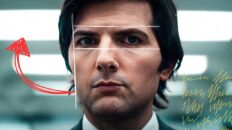As it happens, this year has also seen the release of two limited series—one on Netflix and the other on HBO—which grapple with the kind of tension we are, many of us, feeling at this moment. The most recent is Hollywood, a glitzy fantasia from producer Ryan Murphy (Glee, American Horror Story). This series is an alternate history of 1940s cinema where everyone talks like they come from 2020 and has more or less the same social views; it is, as one headline claims, a “woke 40s fantasy”—if we take “woke” in its now-bastardized sense rather than the original meaning. Hollywood is the kind of production that could only occur at this precise cultural moment. The show has nearly every variety of LGBTQ representation. It has racial diversity. It has gender diversity. In all, Murphy and company offer a slick fantasy imagining what would have happened if Hollywood in the 1940s were just a smidge more progressive than it is now. One might think of the show as comfort food, though as I’ll discuss in a minute it is distinctly less filling than a bag of chips.
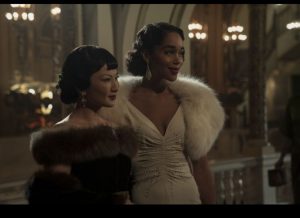
The other recent production is an adaptation of Philip Roth’s The Plot Against America, a miniseries that imagines a very different 1940s than the one Murphy proposes. Produced by David Simon (The Wire), Plot imagines what would have happened if the 1940s had been just a smidge less progressive than it actually was—what if the America Firsters had actually won the election of 1940 by pushing Charles Lindbergh as their presidential nominee. Since Lindbergh is either an anti-Semite or at least very comfortable with anti-Semites, the result is an America that looks uncomfortably like Nazi Germany (or, perhaps, like America today if one happens to be Mexican). Jewish families suddenly find themselves branded as outsiders in their own country. Programs are introduced to “Americanize” these communities. Eventually violence breaks out and people are killed. The series follows the fortunes of one Jewish family as they attempt to navigate this brave old world.
What strikes me, looking at these two productions, is how much they engage with similar questions—and how different their solutions wind up being. Both shows are interested in how individuals engage with social forces beyond their control. Hollywood supports and reinforces the myth—a very American myth and a very regressive one—of the individual actor who boldly steps forward and refuses to be bowed. This is a bastardized Emersonian or Thoreauvian fantasy, albeit one without the intellectual heft that comes with being an Emerson or a Thoreau. In contrast, Plot advances something much closer to what we are all now experiencing (and which many people have always experienced)—a world in which the individual choice to say “no” does not matter or accomplish anything. The question the show asks poses is what individuals should do when faced with this reality.
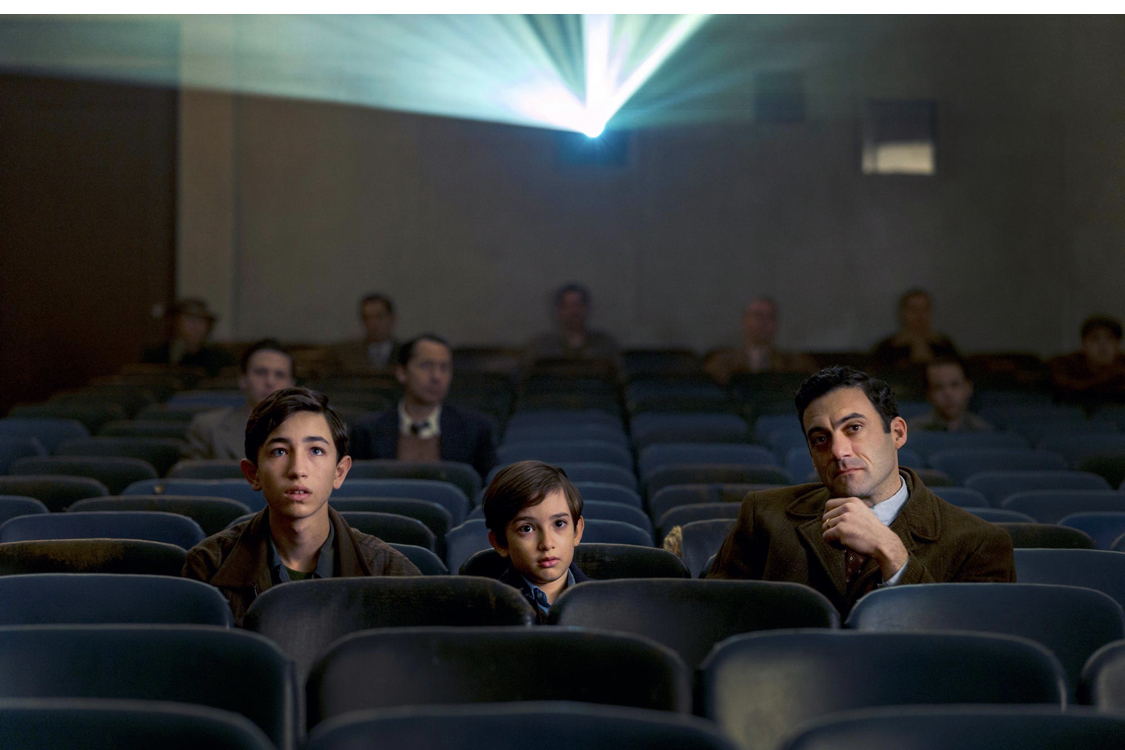
In a way, there is alchemy in Ryan Murphy’s Hollywood as the producer attempts to transmute the lead of history into the gold of fantasy. Hollywood is—perhaps—one of the most Ryan Murphy productions ever. It has everything: camp-light treatment of serious topics (here: racism, sexism, homophobia); elaborately gorgeous set design with eye-popping colors; grande dames who dominate any scene they’re in, mostly because they are grande dames; and, of course, a large collection of beautiful men who spend much of their screen time either naked or nearly so. Like Feud, the show plunders Hollywood gossip, with a stand-in for Scotty Bowers running a high-end male prostitution ring out of a gas station (“Take me to Dreamland”, the customers sigh); with a young Roy Fitzgerald coming to town and meeting a rapacious agent who immediately re-christens him Rock Hudson, promises him fame, and demands to give him a blowjob (such is the guiding genius of the studio system); with a black, gay screenwriter penning a script about Peg Entwhistle, a real-life tragedy in our world transmuted through the double-barreled magic of Hollywood and Hollywood into an aspirational myth.
Recently, a furor erupted on Twitter when Kristen Lopez of Indiewire suggested that Hollywood outdoes Quentin Tarantino’s Once upon a Time…in Hollywood. In her piece, Lopez argues that the audience’s knowledge of the gap between the Murphy fantasy and the Hollywood reality gives the show a tragic atmosphere:
For all the warmth of LuPone’s Avis Ambler — who finds common ground and understanding with her husband’s mistress — as the head of Ace Pictures, there’s the tyranny of MGM studio head Louis B. Mayer, who treated Judy Garland like garbage, forcing her down a spiral of pills and alcoholism. Vicious manager Henry Willson, played by Jim Parsons, may have been able to apologize for his abuse and exploitation of Rock Hudson (Jake Picking), but in reality Willson continued to abuse actors. More than anything, Murphy uses his show to apologize for the sins of the past and give these people the love and respect they deserved in life.
This point is arguable—certainly more than the headline would suggest—but it also lends Murphy’s fantasy too much depth. The article did not deserve the sheer anger of the Twitterati, fanned into flames at the suggestion that Ryan Murphy and Quentin Tarantino might be engaged in similar projects. Lopez is correct here and Film Twitter is wrong; Murphy and Tarantino are manifestly doing the same thing in their own ways. The fact that one might disagree with Lopez about who does it better is incidental.
Hollywood centers around what was for the 1940s an improbably diverse crew: a black gay screenwriter, a half-Asian director, the director’s African American girlfriend as the lead, a young Rock Hudson, his secretly gay agent who manages to get a producer credit, and so on. This crew makes a movie about Peg Entwhistle (they rechristen her Meg and give her a happy ending because they do not like the optics of a black actress failing in Hollywood and committing suicide as a result). I almost said “they attempt to make” this movie, but there is nothing attempted about it; they make it, and with virtually no struggle. The one time it looks like there might be drama surrounding the release of the movie—when the film is torched at the end of the penultimate episode—the show is careful to inform the audience within ten minutes of the final episode that the movie was not burned and that the film will absolutely get released and then that it will absolutely win All The Oscars (which it does, the white male lead being the only exception—a move on the part of the showrunners that suggests that this show is not so uncalculated as it wants to let on). The wish-fulfillment is strong with this one: Anna May Wong gets her Oscar! A black actress wins best actress in 1948 and gets to sit in the actual theater! Rock Hudson gets to go to the Awards holding the hand of his black boyfriend! And then the next year he gets to star in a movie about a gay romance! Tension, drama, suspense—Hollywood has none of that. There are hardly any villains; this is the kind of show where even the sexual predators turn out to have hearts of gold and can be—if not quite forgiven—at least granted a bit of slack by the slack-jawed Rock Hudson.
In short, this is a show about righting historical wrongs. It is about reimagining the past, not as it was but as it should have been. As such, Lopez is correct to connect it to the recent trajectory of Quentin Tarantino’s work. Of his last four movies, three have been revenge-flicks in which the object of vengeance is a specific historical crime—Nazism in Inglorous Basterds (the best of the lot); slavery in Django Unchained; and the Manson killings in Once upon a Time…in Hollywood. To compare OuaTiH to the Murphy series isn’t to compare disparate things; both are rooted in an appreciation of a specific (albeit different) era of Hollywood; both feature cameos by famous figures admired by their creators; and both climax in a swerve into pure fantasy. The fact that Tarantino’s instrument of justice is a flame-thrower and Murphy’s is a lavish awards show might be worth reflecting upon, but structurally they perform exactly the same function: they rewrite the past, suggesting a world in which things might have been different.
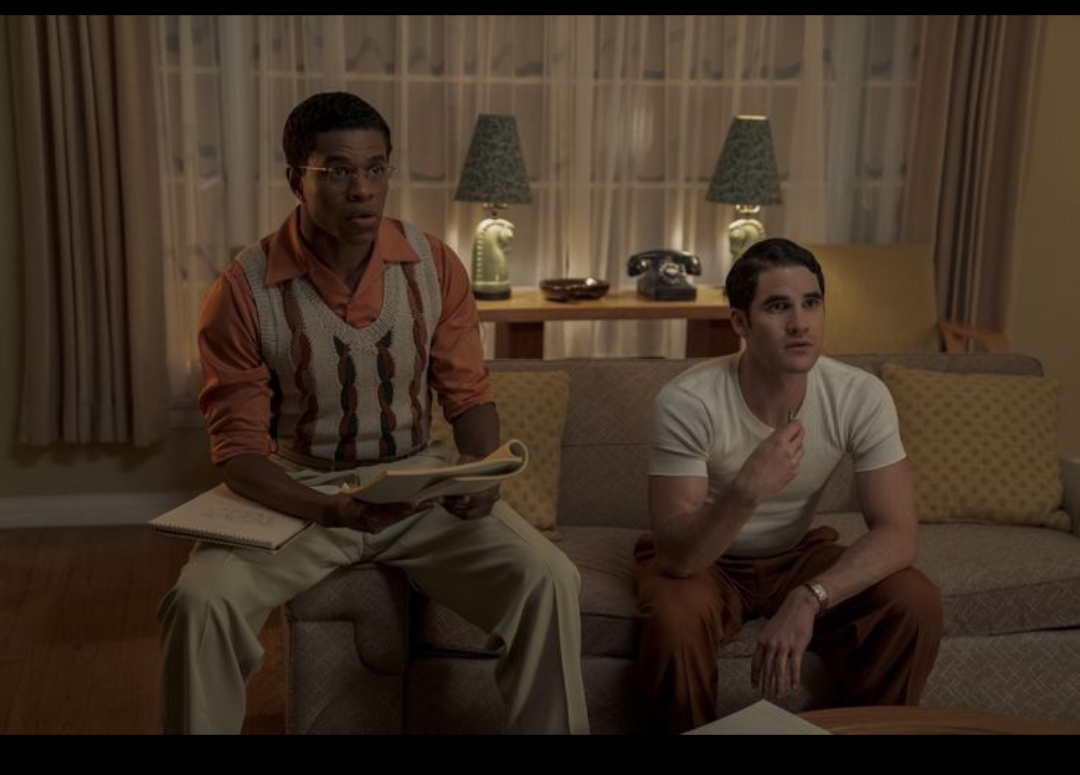
Were it not for the note of cynicism one detects in Murphy’s effort, it would feel churlish to criticize Hollywood too harshly. After all, Murphy is one of the few prominent gay producers creating shows for the mainstream that both foreground and pander to gay audiences. And Hollywood has its moments when, glowing with innocence, it gives audiences things that do not exist in the broader pop-cultural landscape, most notably its parade of beautiful men shot like the pin-up models on the side of 1940s bombers. If nothing else, Murphy and his team understand the fetishistic appeal of the so-called Greatest Generation. For that alone the show deserves to be, if not thanked, at least acknowledged.
That said, there is something terribly calculated about Hollywood that one does not see in OuaTiH. Tarantino, whatever his faults, genuinely loves the culture he pillages; Ryan Murphy, one suspects, loves the idea of loving that culture. Matt Zoller Seitz recently observed on Twitter that JJ Abrams is a pop-cultural fracker; one suspects that Ryan Murphy is to gay culture what Abrams is to pop culture. The plot description above reads like a laundry-list of things that movie podcast gays (who are, I assure you, a distinct class) wistfully ruminate about while discussing movie history (“Can you imagine, just imagine, if Anna May Wong had gotten the role in The Good Earth and then gotten a Best Actress nomination?” they sigh, or “Just imagine if Rock Hudson had been able to be an out, gay man at that time—he might not even have gotten AIDS! So sad”). Ryan Murphy takes all these fantasies and spits them out in Hollywood untainted by reflection or by drama—a steady stream of beautiful men and pre-chewed “hurrah” moments designed to bring a tear to the eye and make the viewer sigh “Alas! If only….”
The problem with this sort of “if only” wish-fulfillment—particularly when undertaken by a mind as relatively unreflective as Ryan Murphy, is that it does a grave injustice to the people it presumes to defend. As Sam Adams points out in a piece for Slate, all of this is not only fantastical; it is insulting to the people who lived through those times:
What rankles about Hollywood’s faux-progressive past isn’t the vision of a more equitable, more just society, but the ease with which it’s achieved. When Meg’s production is announced, Camille and Raymond are harassed on the phone and Avis awakens to a cross burning in her front yard, but no one is hurt, and the danger passes quickly. The casual anachronisms strewn throughout the dialogue—an editor from the silent era refers to people as “creatives”—are a winking acknowledgment of the show’s historical invention, but they’re also laden with smug presentism, the sense that people may not have known how to talk about those issues then but we do now. (Never mind how troglodytic the politics of 2020 will look in 70 years.) It’s an inadvertent but stinging rebuke to the trailblazers who struggled and sacrificed to win partial victories against almost impossible odds, even if the compromises they reached might now seem unacceptable.
Indeed, Adams points out that some of the movies erased by Murphy’s triumphalism were themselves progressive tracts against anti-Semitism. One understands why Murphy would elide this inconvenient fact, since it undermines the very premise of the show to recognize that the social justice issues Hollywood attempts to solve were being hotly debated at the time—which they were, though not always in language we recognize today. As George Hutchinson points out in his book Facing the Abyss, many of the concerns we face today—racism, sexism, and (yes!) homophobia—were very much on the minds of artists in the 1940s. If you do not see them openly in the Hollywood of the time, you certainly see them in literature, where authors dealt with homophobia and homosexuality (Kings Row, The Gallery, The City and the Pillar), racism (Strange Fruit, The Street), and even sexism (A Time to be Born), though the 1940s were a distinctly misogynist decade even by American standards. The idea that people in the 1940s just weren’t given the right push—which is what Hollywood emphatically argues—is, at best, ahistorical in ways that are deeper than simply changing who won an Oscar.
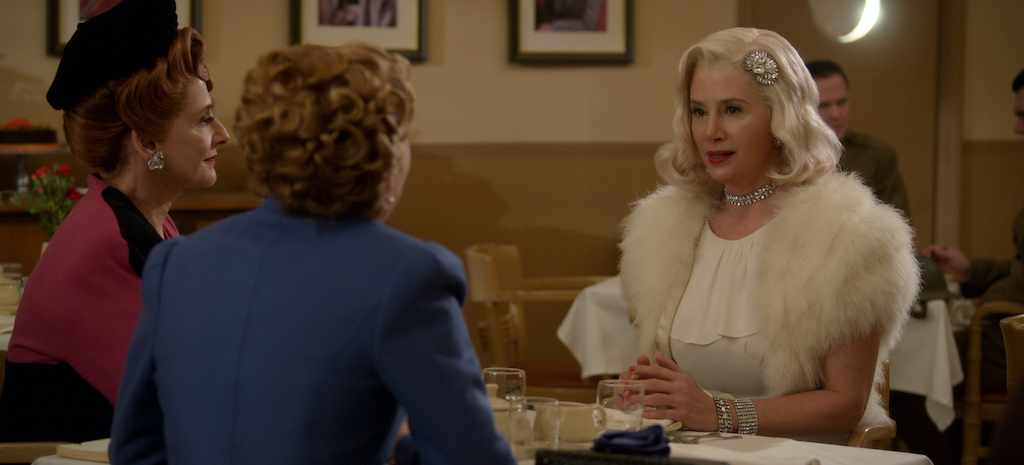
The showrunners clearly want to rectify historical wrongs, but the unfortunate side-effect is a kind of victim-blaming. One particularly egregious example is in the final episode, when starlet Camille Washington (Laura Harrier) forces her way into the Academy Awards ceremony. Now, it is certainly true that she should be there—it is almost as certainly true that Anna May Wong should have been there, that Hattie McDaniels should have been there, that any number of minority-raced actors should have been there (and, indeed, should still be there). But beneath the chills one gets seeing this strong, confident African American woman shame the racist hotel usher into letting her sit where she deserves to sit is a sneaking thought—well, that was easy! All we needed was the right group of people and the one person who was willing to demand what she deserves! Why didn’t Anna May Wong think of that? In the end, of course, it is what Kyle Turner devastatingly calls “a self-congratulatory show about self-congratulatory people making a self-congratulatory film about self-congratulatory people.”
Consider the case of Rock Hudson—the genuinely tragic story, one of many, of a man who lived in the closet and so was never able to present himself as an out gay man in Hollywood. In an interview with them magazine, Ryan Murphy is open about his motivations in re-structuring the shape of Hudson’s life, saying that he “wanted Rock to have that moment where he says to Henry, ‘Fuck you, you’re fired.’ If only that had happened. If only Rock Hudson had felt empowered enough to do that.” That sense of “If only” pervades the entire series. If only the right movie had come along with the right screenwriter and Rock could have just…walked into the Academy Awards hand-in-hand with his lover and they could have shamed the assembled audience (who in the show put up some very light booing, nothing more, because love is love, y’all). It is certainly nice to imagine Rock Hudson living a happily uncloseted life, and again one would be churlish to begrudge audiences such a fantasy. But what is underneath the presentation here? Nothing less than the idea that all we need is just enough pluck to stand up and tell the nattering nabobs of normalcy that they are being mean. And once we do that, the world’s our oyster.
This is the same kind of fantasy that repositions Rosa Parks from an important actor in a complex operation to a little woman who was just too tired to move. It is the same kind of fantasy that makes the rich slaveholders of the American Revolution into plucky underdogs going up against the might of the British Empire. It is, in fact, the same kind of fantasy that allows us to imagine that America is the Rebellion in Star Wars when Lucas always intended it to be the Evil Empire. And it is precisely the same fantasy that makes us want to imagine that we would stand up to tyranny, should it raise its head in America. Of course, as David Simon observes in an interview with Vulture, many of us imagine that we would be so bold. The truth is that most of us would not—do not—do any such thing. And most people who suffer from sexism or racism or homophobia do not square their jaw and just-say-no their way into the Oscar ceremony, because what they would get from that is at best mockery, and at worst a broken jaw or a broken skull or a broken back. The fantasy peddled by Hollywood—as nice as it is in the abstract—is a destructive fantasy because it whispers that if you suffer from these things it is because you are not as wonderful as these characters—these fictional characters. Ultimately, the blame lies with you.
This sort of ahistorical fantasy robs the show of any sense of bite. There are approaches to critiques of the abuses within the industry, both historical and contemporary, but the show inevitably turns away from them before they quite materialize. Hollywood positions gay director George Cukor as a kind of golden-age Bryan Singer, with sex parties at his lavish estate, but there is no hint of Singer’s alleged impropriety with underaged boys. The casting couch as a (or, possibly, the?) way to “make it” is likewise present but unexplored; the token straight white character is given the chance to make it that way and turns it down, and another producer has a crisis of conscience before he can exploit Rock Hudson. But this is the kind of show where everyone is secretly nice; any satire of Hollywood is eclipsed by the overwhelming wholesomeness of these gigolos and directors and actors and agents (all, implicitly, the same thing—not that the show explores that, either).
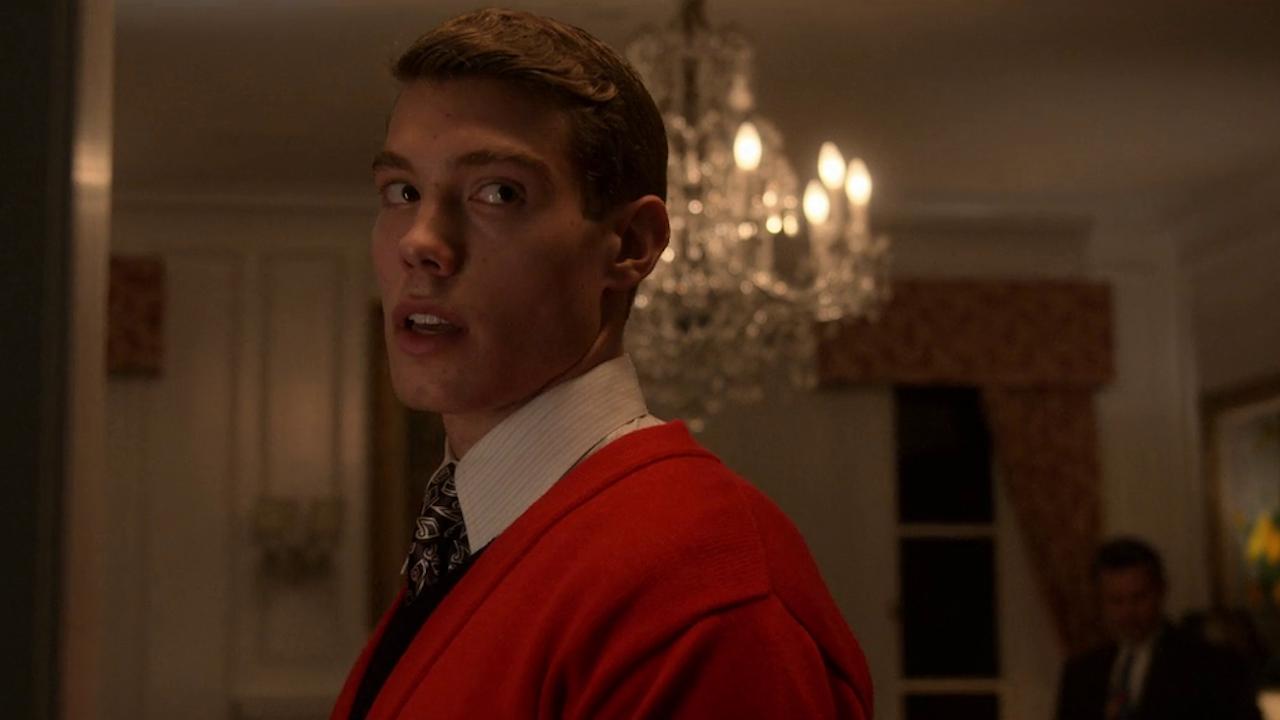
One is tempted to compare the show again to OuaTiH, or to the far-superior-to-both Hail, Caesar!, but Hollywood exists in a bigger cultural moment—one which (alas) this piece cannot address. There are two roughly-overlapping movements in some corners of the televisual landscape. On one side are alt-histories of the late-30s and 40s, of which Hollywood is an example: The Terror: Infamy and Penny Dreadful: City of Angels both present minority perspectives of the events of that decade, filtered through the lens of Japanese or Mexican folk-traditions respectively. On the other hand, the Jewish experience in America is a topic of shows such as (again) Penny Dreadful: City of Angels and Hunters. Sitting on the overlap in this minor Venn diagram is the recently-concluded limited series The Plot against America, based on the novel by Philip Roth.
The Plot Against America is set in the early years of World War II and presents the rise of an anti-Semitic, fascist government in America headed by Charles Lindbergh. The series follows the fortunes of a New Jersey-based Jewish family as they watch with mounting concern as their country turns itself over to hatred and violence. This alternative history takes place in a fictional Lindbergh administration, which begins to institute policies designed to de-Jewify American Jewry. At first, the administration’s actions seem innocuous. They institute a work-away-from-home policy for young Jewish boys called “Just Folks.” Under this policy, young men are sent to live on farms in middle America, ostensibly to allow them to get to know “real America.” Among the young persons sent out thus is the oldest son, Sandy (Caleb Malis). Over the course of the series, the country slides downward, as violent nationalism and racism take control. The decline is only halted—perhaps—when Lindbergh goes missing and his wife makes an impassioned radio address pleading for an end to the madness. In Roth’s novel, Roosevelt is promptly re-elected and the US enters the War just a little bit late. History resumes its “proper” course. In the series, showrunner David Simon introduces an ambiguous note—the election that should elect Roosevelt is being tampered with (it is unclear who is doing the tampering, though we can speculate) and so the ultimate outcome is in doubt. In the above-linked interview with Vulture, Simon says that this is a deliberate choice, since the show airs in an election year:
Looking at our own fundamental problems with our electoral process right now, the lack of faith any of us can have that the popular will is going to be conveyed through the American voting structure, we said, “We’re coming on an election year. We need to comment. We need to speak very bluntly to what this election means.” So we ended without feeling the need to say, “…and then America was restored.” The only reason to spend the money to film [this show] is that this generation is facing a fundamental threat to the norms of our republic and self-governance.
This move puts Plot in an indirect conversation with Hollywood. In the case of Murphy’s show, the historical alteration operates as a fantasy—wouldn’t it be nice?—while in the case of Plot the moral burden is put onto the audience: what will you do to preserve democracy? It is a moral, rather than an onanistic, call.
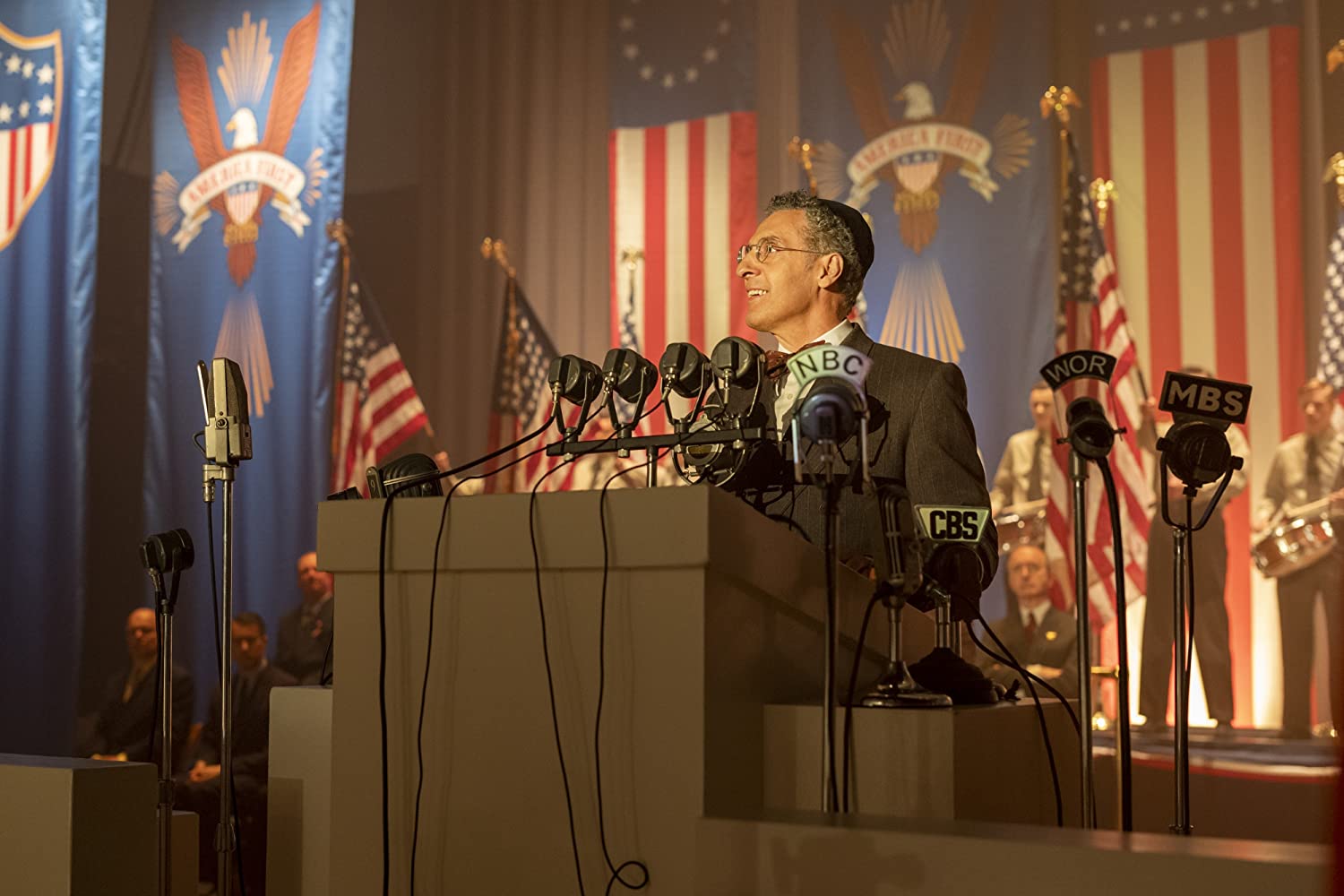
The Plot Against America is less interested in political maneuvering or even Resistance than it is on the impact such a regime would have on the daily lives of the people who have to live in constant fear of what the administration might do next. And, with the exception of a late-series plot element (one not original to the novel), for the most part these characters do not engage in any kind of fruitful action. Plot is unique in that it does not locate a group of plucky freedom-fighters and follow their struggles to overthrow Lindberghian fascism.
This is not a wish-fulfillment fantasy; not the very American fantasy in which the plucky resistance goes up against the evil empire. There is little faith in the ability of individuals to do anything. The most revolutionary the show gets is when it goes with the Levins to visit Washington D.C., where the father, Herman Levin (Morgan Spector) makes a small act of resistance when he sings to his wife in a sandwich shop. Even the late change I referred to above, which has one character involved (unknown to himself) in the plot to waylay Lindbergh, is left ambiguous. The show implies that several people independently worked in the operation. This character may have had no real influence on events at all. All that we know, in the end, is that Lindbergh goes missing—his fate is unimportant; he vanishes into the historical fog, an almost insignificant figure in the end, himself—simply the spark that touched off this all-too-possible alternate history.
The sort of alternate history imagined by Plot stands as an almost pre-emptive rebuke to the project Murphy undertakes in Hollywood. Most people do not get to choose the time they live in. Neither do they get to choose much of how they respond to those times. Though the Levins repeatedly consider a move to Canada, they never make it. Why? Well, there’s a certain stubbornness on the father’s part (this is my country, dammit, and I won’t let the fascists have it!) and those sorts of character-motivations do matter for determining the fate of the family. But that choice—to move or not to move—is very minor, in the end, and it is hard to see how making another choice would have effectively altered their fate. Similarly, when Alvin Levin (Anthony Boyle) goes to fight, thinking he is going to strike a blow for freedom and for Jews everywhere, he gets his leg blown off and winds up mostly washed-up back in New Jersey.
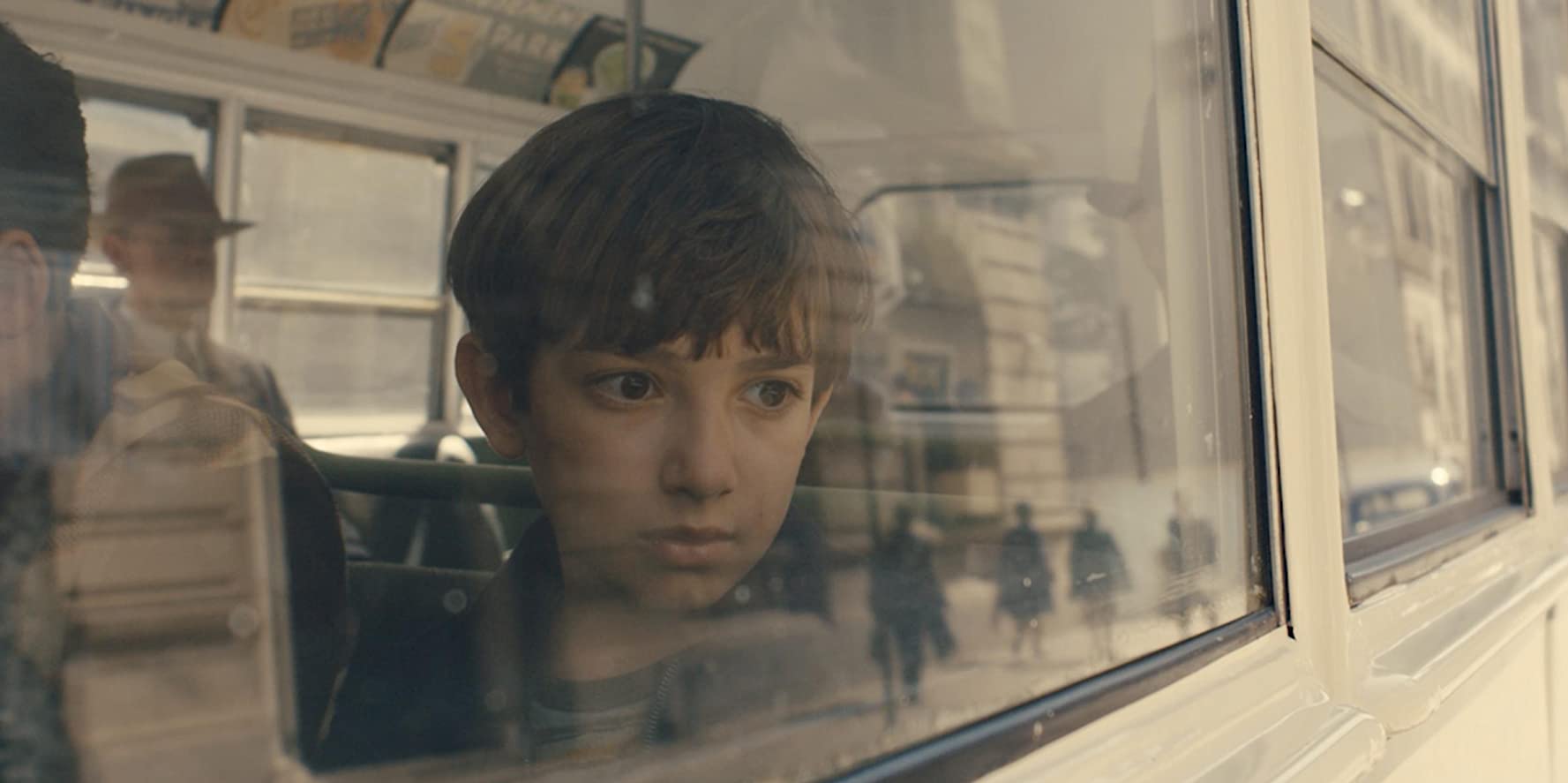
The Plot Against America portrays people in the grip of history, their private lives determined by historical forces rather than the other way around. It is a less comforting fantasy than the one offered by Hollywood. But it is an important one for these times. As I write this, many of us are under lockdown, uncertain when we can go back to our normal lives—uncertain, even, whether we will have a normal life to which we can return. I am certain we have all fantasized about taking Bold Action. That is precisely the fantasy protestors against lockdown are engaging in; the idea that if they just stare into the face of history, they can make history blink. The truth is that you cannot. The truth is that history does not care about you or your freedom or your paycheck. It does not care if you are frightened or brave; it will do with you what it wants to do and it will move on. The Hollywood vision of history says that if you are crushed by that realization it must be your fault.
The Plot Against America suggests a wiser way of living. It is not more comforting; it is heartbreaking in its own way because it means that families will be torn apart, that limbs will be severed, that children will rebel and that people will die—and there is nothing that we can do. Well. Almost nothing. Late in the series, hordes of white supremacists are tracking down and killing Jews, and one of the victims is a former neighbor of the Levins’—a woman who, through young Philip (Azhy Robertson)’s inadvertent (childish) callousness, has been shipped with her son into rural America. The son, Seldon (Jacob Laval)—who is characterized as being physically frail and who begins panicking about his mother’s death even before the Levin family does—is alone in his house. Herman Levin determines that the only thing to do is to drive cross-country to pick the boy up. And he does. The result is a harrowing road trip, as Levin and Sandy drive past burning Jewish businesses and narrowly avoid encounters with members of the KKK. Finally, they reach the farm where Sandy spent time with the gentile family, the members of which have been taking care of the boy while waiting for the Levins to arrive.
The family’s kindness to the boy (as well as the kindness of other strangers during the earlier trip to Washington D.C.) illustrates the extent to which members of different identity groups can bond together against the forces of hate. The show shows people in the grip of history managing to make individual acts of heroism. These are not grand gestures; the rescue of Seldon does not bring the downfall of Lindbergh, nor does it fundamentally alter the fate of anyone except the boy himself. This is not, in short, a triumphant tale, not in the sense that Murphy offers in Hollywood. Even when something good happens—the rescue of the boy or the disappearance of Lindbergh and the intervention of Anne Morrow Lindbergh—there is a sense of helplessness. These small gestures are set against a big world that fundamentally does not care. But it is by these gestures that the protagonists maintain their humanity.
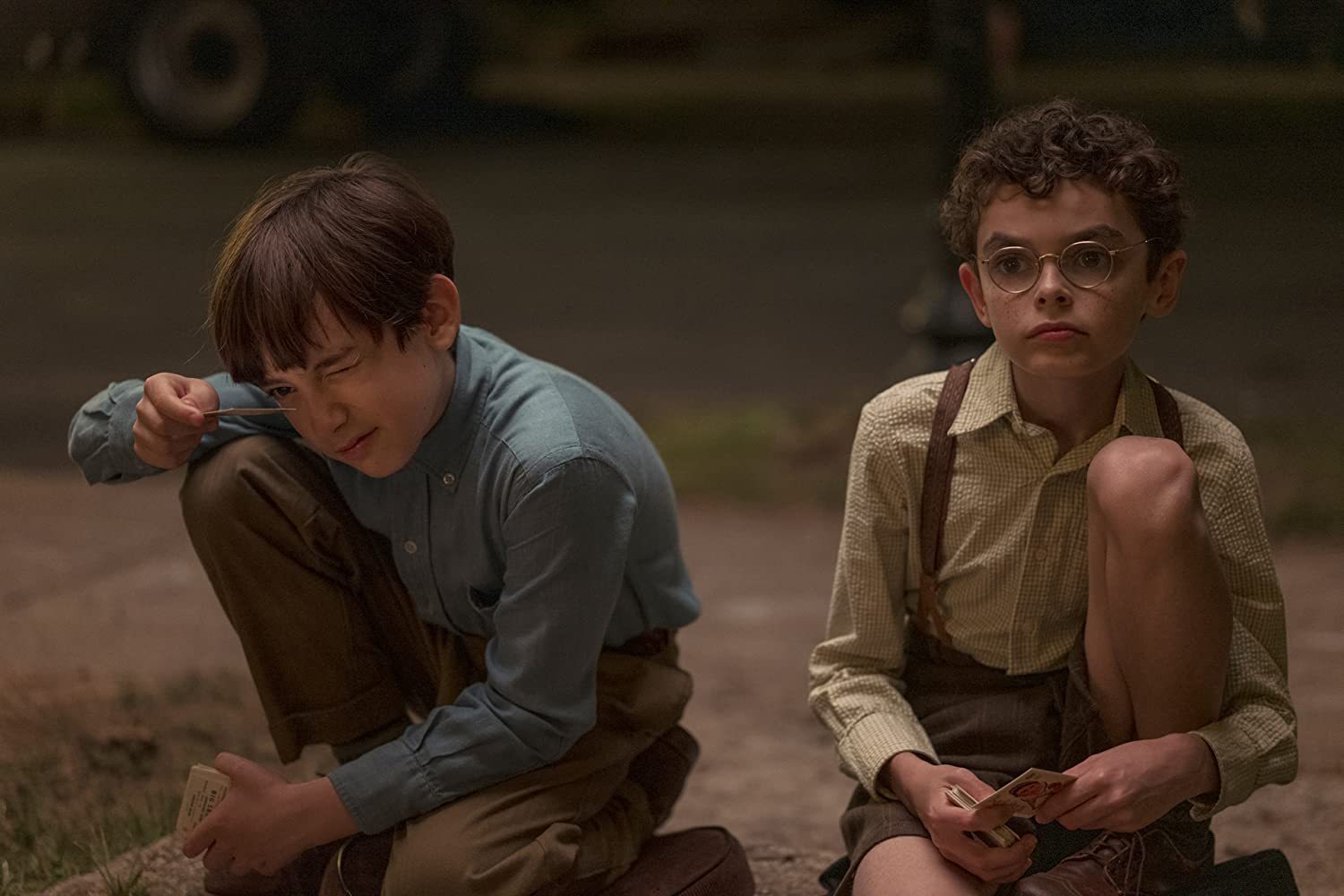
None of this is deliberate; the showrunners involved could never have guessed or suspected that their shows would air at a time when a foundational myth of America—at least, of post-WWII America—faces one of the greatest strains in its history. The fact that two high-profile shows foreground such different approaches to our powerlessness in the face of history can only be considered an improbable cosmic coincidence. Nevertheless, here we are. The myth of the hero does not work in these circumstances; the myth of the individual, separated from structural support, just choosing not to drive or eat meat or use plastic straws has always been just that—a myth. You cannot just-say-no your way into a more righteous world. You cannot refuse to be grasped by history. These two alternative visions of the 1940s offer disparate fantasies about how much we can do. One of them is superficially comforting but ultimately profoundly disappointing. Hollywood alternately promises its viewers easy victory and them for not achieving that victory. The Plot Against America—seemingly less comforting—tells us that all we can do is what we do and that all we have is each other. To be grasped by history is to struggle to maintain, not independence, but humaneness. Perhaps the small victories we might win along the way are all we get. Perhaps they are enough enough. They probably will have to be.



